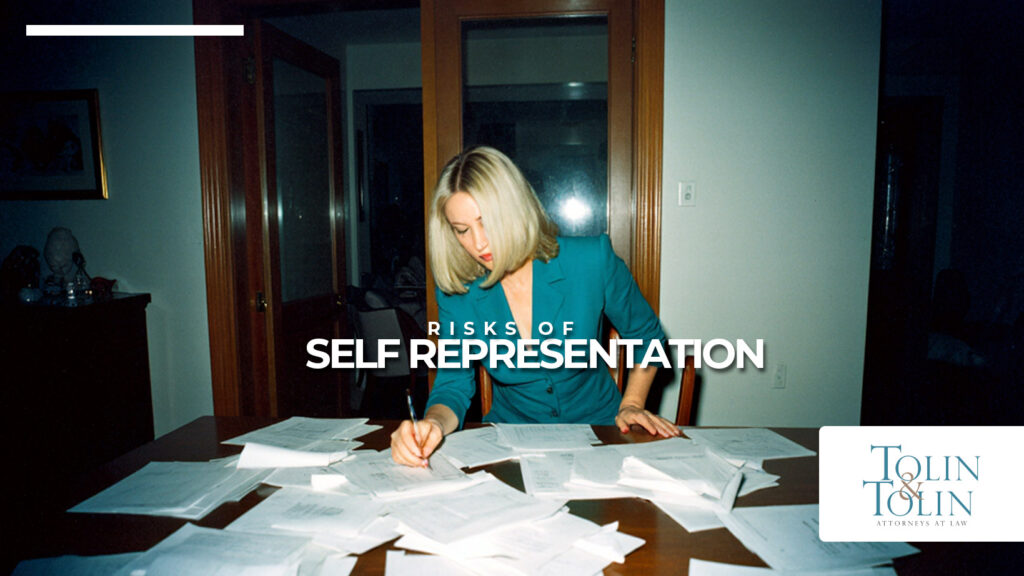Divorce and child custody can feel like an uphill battle. For some, the thought of representing oneself—also known as “pro se” representation—holds a certain allure, especially when financial pressures loom large. However, before taking that plunge, it’s crucial to understand the layered complexities and risks involved in self-representation.
What is Self-Representation?
Self-representation means that you choose to handle your own legal case without an attorney. While this might sound empowering, bear in mind that family law is fraught with intricate rules, terminology, and procedures designed to ensure fairness. More often than not, the emotional weight of family disputes amplifies the stakes, making the impacts of legal missteps feel even more profound.
Why People Tend to Self-Represent
Why do so many individuals opt to forgo professional legal representation? An array of reasons compels people down this rocky path:
- Financial Constraints: Rising legal fees can be daunting! Many individuals simply believe that hiring a lawyer is a luxury they cannot afford, opting for self-representation as a desperate workaround. There is a false sense that by not hiring an attorney, you will save money overall. However, this perspective overlooks the stark reality that without professional guidance, you may face costly repercussions; a bad outcome due to lack of representation can lead to far greater financial losses, such as losing out on fair asset division or enduring unfavorable child support arrangements.
- Belief in Simplicity: Many people incorrectly assume that their situation is straightforward. “How complex can it be?” they wonder, blinded by a perceived simplicity that might not exist.
- Desire for Control: Taking charge of one’s legal proceedings may appear appealing. The idea of driving your own ship, making your own decisions, seems liberating, doesn’t it?
- Misinformation: The legal world demands specialized knowledge. Unfortunately, incomplete or incorrect information often leads individuals to believe they can manage without expert support.
What are the Risks?
With the glimmer of self-representation comes a laundry list of risks that can catch the unprepared off-guard:
Complex Legal Procedures & Deadlines
Navigating legal procedures can feel like trying to solve a maze blindfolded. Forgetting a critical deadline or failing to file documents correctly can wreak havoc on your case, potentially leading to unfavorable outcomes.
Unfavorable Custody/Parenting Time Outcomes
Imagine standing in a courtroom—your heart races, your palms sweat, and emotions run high. During such a tense moment, it’s all too easy to slip up. A careless comment or poorly presented argument could significantly impact custody arrangements, leaving parents without the time they deserve with their children. The stakes are very high.
Financial Losses & Unfair Settlements
In the cacophony of emotions, many self-represented individuals may settle for less than they deserve—assets, alimony, or child support may be awarded unfairly. Miscalculations can haunt you for years, depriving you of your rightful due.
Invalid or Unenforceable Agreements
In the busy haze of family discord, it’s easy to draft poorly constructed agreements, violating legal standards. Such mistakes can render agreements unenforceable or void, compounding frustration instead of resolving conflicts.
Emotional Overwhelm & Tactical Errors
Your mind races. You’re filled with worries about your children, your future, and whether you’ll make it through at all. Under pressure, you might conflate logic with emotion, leading to decisions that seem right but are legally flawed.
Disadvantage Against Opposing Counsel
Lastly, be prepared to face off against a seasoned attorney who knows the ins and outs of family law. The odds may not be in your favor if you enter the arena unarmed with legal expertise. A well-prepared attorney can exploit procedural gaps and strategically maneuver situations to their client’s advantage—making self-representation feel even more daunting.
How to Avoid Those Risks by Hiring Tolin & Tolin
So, how can one escape the pitfalls of self-representation? The answer lies with the empathetic experts at Tolin & Tolin. With a strong commitment to guiding clients through the tumultuous waters of family law, Tolin & Tolin brings both compassion and legal insight to every case.
Engaging with a seasoned attorney offers you a wealth of advantages that self-representation simply cannot provide:
- Expert Guidance: Tolin & Tolin can unravel the complexities of family law, ensuring you never miss a crucial deadline or procedural requirement.
- Strategic Representation: Every argument, every piece of evidence—attorneys know how to present them effectively. With their help, you can approach your case with confidence rather than fear.
- Emotional Support: Tolin & Tolin understands that family disputes are deeply personal. They advocate not just for your legal rights, but for your emotional well-being, providing a supportive presence in a difficult time.
- Long-term Outlook: A good attorney will look beyond the current challenge, considering how decisions can affect your future—ensuring you don’t settle for less than you rightly deserve.
If you’ve found yourself contemplating the do-it-yourself approach to your divorce or child custody case, take a moment to reflect on the potential risks involved. Remember, the journey is challenging enough without the additional burden of navigating complex legal waters alone.
So why not put the experience of Tolin & Tolin to work for you? Reach out today for a consultation. Let them help you write a new chapter—one filled with clarity, support, and confidence in your future.

